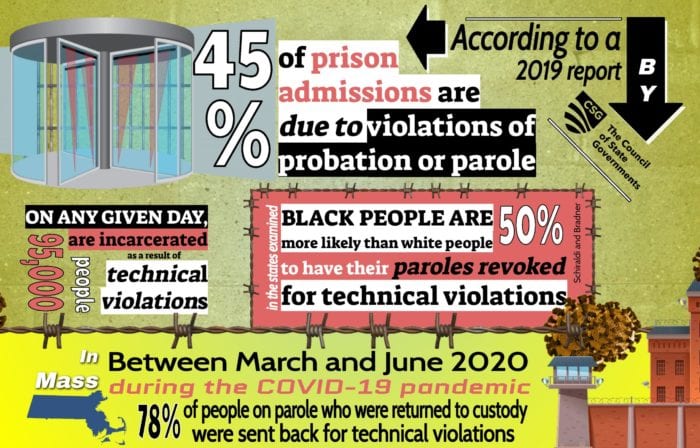
“The very least that Mass can do is make it easier for families to connect with loved ones who are locked up at this frantic moment.”
You should expect us to keep sounding alarms about the report by journalist Jean Trounstine that we published last week. As she revealed through a series of public information requests, nearly 80% of the people on parole who were sent back to prison in Mass during the height of the COVID-19 outbreak were returned for technical violations. That is, they were guilty of something like coming home late after a state-mandated curfew, or failing a drug test, as opposed to committing a crime.
Sadly, parole revocations are just one of many issues facing activists and attorneys who wish to reform local, state, and federal prisons. As we also recently covered, a bill currently sitting in limbo on Beacon Hill would allow for prisoners to have free phone calls, making it so that “incarcerated people can stay connected with their loved ones during the COVID-19 crisis without incurring horrendous costs.”
That measure would deliver a major improvement, even if, as Jean noted in another article, “just when prisoners and their families thought they might be able to save a buck, the Mass Department of Correction (DOC) is rolling out a plan to charge them for video visitation. And they’re charging a significant amount for the privilege of connecting through one of the same services that gouged them on telephone calls.”
It’s anybody’s guess how much of the momentum driving the Black Lives Matter movement will extend behind the wall. Or rather, how far lawmakers who are determined to preserve the status quo of locking up as many people of color as possible are willing to budge in the moment, with an unprecedented spotlight on their actions.
No matter their reaction, though, even if there are surprisingly progressive responses, giant changes will take time. During that wait, the very least that Mass can do is make it easier for families to connect with loved ones who are locked up at this frantic moment. As Elizabeth Rucker, a Dig reader from Roxbury, wrote in a letter to us:
Dig published Jean Trounstine’s coverage of the No Cost Calls legislation and impending pay-for-play video calls in August and June. Both pieces point out what a drain this cost is on families who are most impacted by police surveillance and incarceration.
The time is now for MA legislators to correct this injustice: regardless of how the money is used, incarcerated people’s loved ones are not valid sources of funding for police and prisons.
As a white ally who also spends $400 per year on calls to my Black, brown, and LGBTQ loved ones in MA prisons, I stand in solidarity with Black and brown communities calling for No Cost Calls and encourage our legislature to relieve this financial burden.
Dig Staff means this article was a collaborative effort. Teamwork, as we like to call it.

